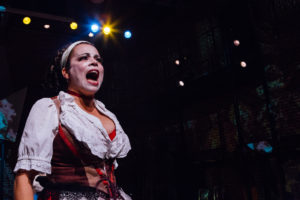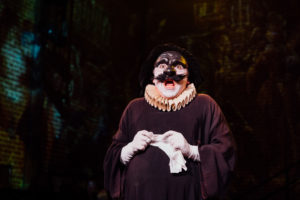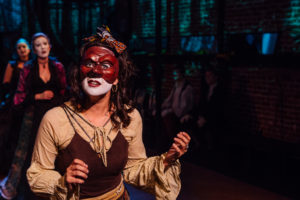Theater’s Bawdy Beginnings
By
Joseph Eastburn
Harlequino: On to Freedom at the Actors’ Gang in Culver City is a rambunctious celebration of the characters and history of the Commedia dell’Arte. Written and directed by Tim Robbins, it’s a high-wire romp through early 16th Century Italian streets performed in the Gang’s signature Commedia “style” using masks, period costumes and outlandish behavior—their emotions funneled with piercing comic intensity at the audience as a way of communicating with each other—so we’re pulled into the middle of a three-way interaction with the actors. We experience a play about the Commedia dell’Arte performed in the style of the Commedia dell’Arte. It’s a delicious double-whammy.
It tells the story of Harlequino, a black servant during the throes of the African slave trade to Europe, surrounded by the hypocrisy of a rich, authoritarian class who were satirized in the town square, as the program suggests, by roving bands of actors and musicians who functioned as the modern equivalent of mobile media outlets, delivering and commenting on the news of the day. That these Commedia characters inject opinion in the most outrageous fashion not only captures a period of European history (and the beginnings of theater) it also skewers our current gobsmacked American political climate of “alternative facts” and “fake” news.
The play is presided over by Dr. Phineus Preamble, a theoretical windbag who appears at the side of the stage in a robe and mask. He’s played with a hilariously dizzying spew of malapropisms and vocal pyrotechnics by Will McFadden as the streets around him come to life when a local troop acts out the stock Commedia characters. The fact that they misbehave while he corrects and criticizes them is part of the fun. He dismisses everything they do and stubbornly references only the original Commedia characters (which are projected on the walls) claiming he only wants to put on an accurate slide show. His interruptions become the spine of the play, as the raucous story unspools. As near as I can tell, here is the plot:
Pantalone, a lusty old man played with joyous absurdity by Pierre Adeli, wants to have carnal relations with Madame Brancantini, a gleefully nutty noble woman with candy cotton hair portrayed by the Mary Eileen O’Donnell. He intends to use the poet and hunchback, Pulcinella, Cihan Sahin, (whose lines I had a little trouble understanding), to provide the poetic inspiration to grease his path toward her bed. His lewd recitation of poetry is but one example of an overall raunchy tone that seems a perfect way to present these characters to a modern audience. Pantalone promises his daughter, Isabella, to Madame Brancantini’s cousin, Capitano, a strutting military officer of false bravado played by the same actor who plays Mario, the young man Isabella is madly in love with; these young lovers are the Innamorati, played by Lee Margaret Hanson and Adam J. Jefferis with the hysterically exaggerated batshit emotions of youthful love and jealousy. They almost fly, cavorting across the stage as Columbina, Isabella’s maid, portrayed by Sabra Williams, tries to be the one sensible character in sight. At the center of this mayhem is Harlequino, played with heartrending sadness and resignation by Joshua Lamont. Dr. Phineus Preamble insists Harlequino is not a slave—but, in fact, he embodies a hidden system of enslavement that’s not yet acknowledged. There’s a moment when he stops the entire swirling theatrical hysteria in its tracks by asking what it’s like to be free. The ensuing song is powerful.
Many of the evening’s moments are captured in song. My only real criticism of the production was the languid tempo of these songs. So many times, the ensemble had to be scraped off the ceiling of the Ivy Substation in the middle of a delirious assault of word-play, sexual puns, innuendo and slapstick to sing a kind of slow folk song. I couldn’t help feeling that the company needed an uproarious song or two to continue the momentum and capture the theatrical phantasmagoria taking place around them. “The Unicorn Song” does just that.
You could argue that Robbins was breaking up the farcical maelstrom of the Commedia world by slowing things down with songs that often had an underbelly of protest. Was this to bring home the theme of oppression, perhaps, of how we have to stop and acknowledge history is being written by the victors, and they’re lying? Yes. This dovetails with the idea that a serious social message was always present underneath the Commedia’s dark jesting and badinage.
The songs’ tempo was a small problem in an otherwise masterful concept, staging and direction of this company of actors who incarnated their roles with searing comic vehemence. There are so many fantastical and bizarre moments in the play, it’s hard to recount them all. The audience was also giddy with the fresh-as-a-tweet pungent mimicry of the current administration. At the performance I attended, Ted Lieu, the California Congressman, and a donor to the theatre—who has consistently spoken out against the dangerous actions of our President—was sitting next to us and was definitely enjoying himself.
But all this came crashing down when the Inquisidator, played forcefully by Jeff Williams, came down the stairs out of the audience to interrupt the play. The actor was physically large, wore close-cropped hair, a conservative suit, and looked oddly like a tall, buff version of Sean Spicer, the Trump press secretary. This only added to the surreal power of the moment as he arrested the actors and had them carted off. At the end of the play, the actors drew close to the audience, as they did in the opening song, removed their masks and sang a sad song, many with tears in their eyes. The songs were my wife’s favorite part of the evening.
I have to emphasize, Harlequino was two and half hours of amazing theater for $25, without a bad seat in the house. When orchestra tickets for the Los Angeles production of Hamilton at the Pantages Theatre average $570, the Actors’ Gang prices are in keeping with their message of theater for the rest of us. CLOSES MAY 20th!
Other members of the excellent ensemble include: Adam Bennett, Julia Finch, Lee Margaret Hanson, Dora Kiss, Stephanie Pinnock, Bob Turton, Guebri Vanover, Miroslav Vejnovic and Paulette Zubata. Lighting design by Bosco Flanagan, Costume Design by Olivia Courtin, Mask Design by Erhard Stiefel. Projection Design by Cihan Sahin. Production Design by Jason Lovett. Musical Direction and Design by David Robbins, who also played a mean guitar in the band at the back of the stage.


